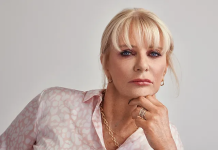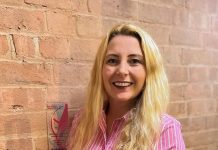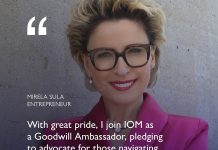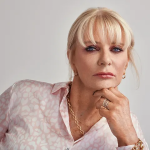The challenges Black, Asian and Minority Ethnic (BAME) women face, motivated Jasmine Bekale Assamoi, to launch an organisation and community that will tackle bias and discrimination. Being an immigrant and alone in a new country away from your family can trigger a loss of confidence. Additionally, there are exterior life experiences that can be detrimental to women like lack of being hired, not being able to access services, or getting the help you need because of poor English. Jasmine uses her Voice Out Women (VOW) platform to target cultural barriers and guides BAME women through training, internships, and other networking opportunities.
She continues her work by highlighting the importance of giving women a sense of belonging.
“We are still helping BAME women to find their voices back, discover themselves, build their confidence, enhance their skills and unleash their potential.”
Why did you choose to leave your home country? Can you also tell us about your childhood?
I am originally from Gabon, a country on the West coast of Central Africa. I chose to leave my home country to learn English professionally for better job prospects after studying sociology at university. Even though we have few English centres to learn English back home, I thought it would be easier and faster to learn English in the UK. Also, I knew I could be allowed to work 20 hours as a student and sponsor my stay. I had planned to stay in the UK for a maximum of four years, one year to learn the language and three years to study business management at a UK university.
I grew up in a happy family with loving parents and 8 siblings. My dad was an engineer and my mum a nurse and both were very supportive of me. It was at the age of 12 that I started developing entrepreneurship skills. I used to sell sweets at school, cakes and sandwiches at church, buying clothes from France and reselling them for profit. I could describe myself as being confident as a young person, very focused and determined. I saved up to build my house at 18 and used the rest of the money to finance my studies in the UK.
What were some battles you faced because of the language barriers and how did life, in general, differ between both countries?
Migrating to the UK in 2003 had a huge impact on me because of the language barrier. Firstly, it was difficult to communicate my needs and know where to find support. For example, I registered with a GP only after being here for 3 years because I didn’t know what I was entitled to, and what services were available for me. I learned English and later graduated from a UK university with a 2:1 in Business Management (Major) and Computing (Minor). But I still wasn’t brave enough to apply for jobs, and I used to live in social isolation. My confidence was lost and my self-esteem was very low. As a result, finding a decent job was difficult. My circle of friends was very limited and I struggled to find role models from similar backgrounds as mine. Back at home, I had support from my family and friends, I was educated and very independent, and I had the confidence to find meaningful employment after my graduation.
What are some challenges that can affect BAME women and what should they do to overcome them?
 BAME women often face the problem of intersectionality, which subtly plunges its roots into the muddy soil of racism, sexism and religiophobia. This proportion of women, marked by their gender, race or religion, endure perceptible rejections in their professional environment through unconscious bias and discrimination that hinder their progress to equal access to leadership positions. These inequalities destroy their will to succeed and limit most of them to the status quo. These issues are even compounded with language barriers making social integration and access to support difficult. Also, making them easy targets for abusive relationships.
BAME women often face the problem of intersectionality, which subtly plunges its roots into the muddy soil of racism, sexism and religiophobia. This proportion of women, marked by their gender, race or religion, endure perceptible rejections in their professional environment through unconscious bias and discrimination that hinder their progress to equal access to leadership positions. These inequalities destroy their will to succeed and limit most of them to the status quo. These issues are even compounded with language barriers making social integration and access to support difficult. Also, making them easy targets for abusive relationships.
Another challenge is the cultural barrier which has denied them access to education, good health and job opportunities, making them financially vulnerable. To overcome those challenges, it will be good practice to make access to education, training, internships and work experiences easy and affordable. For example, there are conditions to be eligible for access to free ESOL classes (if you’ve lived in the country for 3 years), whilst English courses are expensive for those who are not eligible for free classes. This highlights the issue of poverty and childcare costs that prevent them from getting an education.
BAME women should have access to community groups such as Voice Out Woman where they feel safe and empowered. We help to give women who are marginalised, a voice by offering services (advice, counselling, training, volunteering opportunities) and an environment where they foster a sense of belonging.
You’ve launched several companies, what are some Do’s and Don’ts people should follow if they want to maintain a successful company?
For me, it is important to know why we want to start a business and know our ability to carry it out, otherwise, we can easily get bored and disconnected from the business idea. So, my do’s would be first to make sure we enjoy the business we are starting so that when things get difficult, we still have the drive to keep pushing. It is important to understand the power of the niche market so research is a must. Come learn and seek sound advice from professionals (I got myself a business coach).
The latest thing I discovered is to not take business mistakes too hard but to learn from them.
What is the purpose of Voice Out Woman?
The purpose of VOW is to break the social injustice barriers faced by BAME women that are stumbling because of blocks to their autonomy and personal development. We achieve this by bridging the gap between politicians and leaders of different organisations with VOW women through interactive meetings, education, training, shared experiences and networking opportunities. We promote gender equality as we believe women have their place in the boardroom.
Voice Out Woman was born to stimulate and bring to light the flame of integration of BAME women so that the latter, with undeniable potentialities, can hatch and move in the free field of emancipation and social justice. Concretely, our goal is to free them from social rejection and isolation. Our ongoing battle is therefore to instil confidence in those women who have long been held captive in the dungeons and labyrinths of tradition. These women then become women with whom we can and will want to identify with. We seek to partner with individuals and corporations who believe in gender equality and can offer training, mentoring, work experience and internships to our women.
Why did you decide to help enhance confidence in other women?
This is because I encountered that issue myself and I understand what women can go through. I believe that once the issue of confidence and integration are resolved, women can unleash their full potential and become resilient. I agree with Ban Ki Moon, former Secretary-General of the United Nations, who said that “women must be full partners in development so that they can lift their communities out of poverty”. This poverty can have several aspects: cultural, economic and intellectual.
Can you share some life experiences that influenced the creation of your organisation?
I started this group out of my own and some of my friends’ experiences. I graduated from the University of East London but was not confident with my job interview skills, because I am originally from a French-speaking country and I thought the language was a barrier for me. I was also finding it difficult to integrate into the UK society. Some of my friends also had similar experiences; one of them holds a master’s degree but was still working in low paid employment because of the fear of attending a job interview. Another one used to be a university lecturer in her hometown but was sitting at home for many years.
I also met a woman whose children were going to be taken by social services and then I realised the main issue was the fact that she couldn’t communicate properly in English. So we wrote to the tribunal and her solicitor to point out English is not her first language and she never got an interpreter when she was dealing with social services. Luckily, our plea was heard and she got the support she needed. Four years later, she is still living with her 5 children. The last experience I would like to share is of a lady who lived in an abusive relationship for 18 years with very low self-esteem. Through support, she was able to leave the abusive partner and find her first job. We are still helping BAME women to find their voices back, discover themselves, build their confidence, enhance their skills and unleash their potential.
















